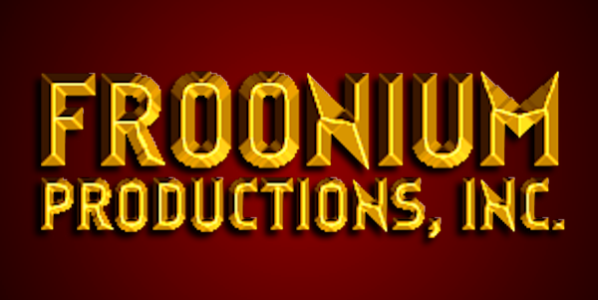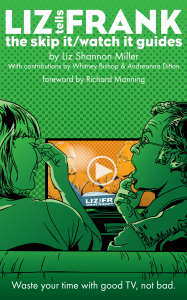For eight years on her blog, Liz Shannon Miller has been telling her friend Frank about TV series, movies, and books that he’s missed, helping him catch up on the good stuff and avoid the less-good stuff.
Two ebook collections of this noble work have already amused and thrilled countless readers around the globe.
I was amused and thrilled myself when Liz approached me to write a foreword to her third “Liz Tells Frank” compilation, though I couldn’t fathom why she chose me. (Perhaps because the book includes Andreanna Ditton’s “Skip It/Watch It Guide” to Farscape, and writing a foreword would give me an opportunity for pre-rebuttal?)
In any case, I leapt at the opportunity, and the result follows. Enjoy the foreword, and then go buy the ebook of Liz Tells Frank: The Skip It/Watch It Guides on Amazon!
FOREWORD, by Richard Manning ((I write for television. I never get to use footnotes in scripts. I like footnotes. You’ve been warned.))
Tens of years ago, when typewriters ((Devices comprising a keyboard and printer but lacking CPU or storage; pressing a key imprinted a character directly onto a sheet of paper.)) still walked the earth and “personal computers” were clunky, cantankerous contraptions that could only beep annoyingly and display glowing pus-green text, when television was still in its infancy—well, okay, out of its infancy but still wetting the bed and refusing to eat its vegetables, when there were no InterNets and people had to walk miles in the snow ((Uphill both ways, naturally.)) to newsstands ((Retail outlets where one could purchase printed “newspapers” (daily or weekly compilations of advertising, comic strips, classified advertising, editorials, horoscopes, advertising supplements, and occasionally news) or “magazines” (weekly or monthly volumes of glossy advertising, fashion photos, gossip, or porn).)) to acquire their porn, the concept of “fandom” was all but unknown to We Who Work in Television.
In those innocent yet rococo times, when “cutting a film” meant exactly that—chopping up and pasting together long strips of perforated celluloid, when broadcasters still respected their programming enough not to deface it ((The truly important portions of their programming, of course, remain pristine and untouched to this day; it’s only the trivia in between the commercials that gets defaced.)) with logos and animated promos, and when the Great Viewing Public was only dimly aware that creatures such as “television writers” actually existed, WWWiT labored in a vacuum. ((Not literally, of course, because we’d’ve died, but there’s a decent analogy rattling around in there somewhere about the lack of sound in a vacuum.))
Back then, the Creators and the Consumers ((Or, as I like to describe them, the “pushers” and the “junkies.”)) were twains that never met. ((Probably because they were on non-intersecting twacks. I agree that’s awful, but the only other metaphor I could come up with was something like “shippers that pass in the night,” which seemed both too esoteric and not apt enough.)) WWWiT would conceive our ideas, birth our teleplays, nurture our episodes, and set them free ((Were this an audiobook, I would likely be singing “Born Free” at this point. Count your blessings.)) into the ether, to be met with a resounding silence. ((“Resounding silence” is a goofy phrase when you think about it, kinda like “a blinding darkness,” but folks keep using it, so who am I to defy the zeitgeist?)) No applause. No boos. No thoughtful exegeses. ((Nor even thoughtless exegeses.)) No floral bouquets nor shrieking groupies. In short, no feedback whatever. Sure, critics would review the pilot and perhaps a subsequent season opener or two, but beyond that? The audience may have been listening, ((As proclaimed by THX™.)) but its speech, if any, rarely reached the ears of WWWiT.
However, when the mighty transcontinental series of tubes was completed ((The final connection, of course, took place at Promontory Summit, Utah and was commemorated with a Golden Power Spike. (This joke isn’t quite as labored as it might seem; go look up “Golden Spike” and read about the U.S.’s first nationwide media event.)) and the World’s Widest Web lurched to life, feedback sprouted everywhere. ((Like mushrooms… some edible, some poisonous. Now there’s a nice metaphor. I could do something with that.)) We could now peruse countless discussion boards and discover that viewers had caught the obscure Monty Python reference we’d slipped into an episode… or that they’d mercilessly nailed us on some dubious plot logic we’d thought would pass unnoticed. We could lurk in chatrooms as our episodes aired and revel in real-time gasps and screams when characters kissed and/or killed each other.
Some of us rebelled, not wanting feedback that was anything less than absolute worship. Some of us didn’t react well, scolding our newly-voiced critics with accusations of “[writing] crap from behind the safety of anonymity” ((JMS v. Cronan, 1998. When they build the Fandom Hall of Fame, my first nomination will be Cronan Maliki Jamel Thompson… and my second will be Emily Salzfass who, like Cronan, left us far too soon.)) or “interrogating this text from the wrong perspective.” ((Rice v. Negative Voices on Amazon, 2004. Yes, it’s from the world of literature, not television, but it’s too delicious to leave out.))
However, most ((Well, many. Quite a few. Lots. Several. A not insignificant number. Well, me, anyway.)) of WWWiT ((Yes, I know, in this context it should be UWWiT.)) were (and still are) utterly delighted to sample the sprawling internet buffet of reaction and criticism. Some of it’s tasty; some of it may be hard to swallow; ((But good for us anyway, like broccoli.)) all of it (yes, even the short and pointed reactions such as “YOU’RE SHOW SUCKZ”) is appreciated. We made something; you took the time to watch; you liked it or you didn’t, and you made the effort to say why.
Which, at long last, brings me to the motley and prolific Liz Shannon Miller, who’s been serving up her own breezy brand of commentary since 2005. ((Good lord, that’s a long time. As the Bible sort of says, “Greater love hath no fan than this, than a fan lay down and scan endless sludge so her readers don’t have to.”)) Liz’s critiques are packed with humor, taste, intelligence, plus a genuine love for the media she surveys—and the results are not only glorious to behold but also a hell of a lot of fun to read.
So sit back, relax, ((Or stand up and be tense, if that’s how you prefer to read.)) and enjoy Liz’s third compilation of The Best of “Liz Tells Frank,” ((Okay, honestly, I don’t know if it’s really “The Best Of.” It might just be “Whatever Stuff She’s Churned Out Since Volume 2.” You be the judge. (And then blog about it! “[Your Name Here] Tells [Some Other Name Here] About ‘Liz Tells Frank!’”) )) as she and her outstanding sisters-in-snark Whitney Bishop and Andreanna Ditton ((Apparently they get to cover the stuff even Liz won’t touch, like that weird frelling Fire Escape show.)) interrogate the text from the right perspective and separate the soaring eagles from the plummeting turkeys. ((Yes, this is a reference to “As God is my witness, I thought turkeys could fly”—one of the finest punch lines in the history of television.)) If this book saves you from wasting that hour on that “Very Special Episode” that isn’t so special after all, ((Or prompts you at long last to go try out that book/series/movie/videogame you’ve never seen—and fall madly in love with it.)) the tireless labors of its valiant authors will have borne fruit, ((Were this an audiobook, I would definitely be singing “Borne Fruit” at this point, to the tune of “Born Free.” You are SO lucky.)) and I hope you’ll join me in rewarding them with a hearty chorus of “YOU’RE BOOK ROCKZ!!!!1!”

